Add your name to stand against this gruesome industry
Humane Society International / Europe
Humane Society International / Europe
Add your name to stand against this gruesome industry
Humane Society International
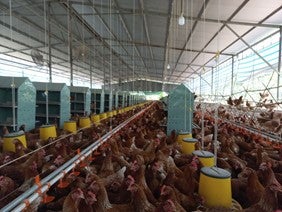
HO CHI MINH CITY—One of the largest egg suppliers and processing companies in South Viet Nam, Vinh Thanh Dat (V.Food), has joined the global cage-free movement by launching their first certified cage-free egg brand in the country. The project is freeing thousands of hens from cages in the first year and will expand in the years to come, with the assistance of Humane Society International (HSI), a global organization working to protect all animals.
As an industry pioneer, V.Food has observed the cage-free movement increasing around the globe. The company management team has a vision to differentiate from the most common industrial way of producing eggs in Viet Nam, where nearly 77 million hens are confined in small, crowded, wire cages every year.
With this project, and as of today, V.Food has become the first producer and processing company to earn the Certified Humane label in Viet Nam, meeting dozens of requirements for the health, nutrition and management of cage-free hens under the Humane Farm Animal Care (HFAC) standards. Consumers will be able to find V.Food’s Cage-free Eggs brand in the largest supermarkets in Ho Chi Minh City soon. These eggs are packaged in paper boxes, differentiating them from other single-use plastic egg boxes already in the market, a further sign of V.Food commitment to corporate social responsibility, and to the community and environment.
The two single-floor, cage-free barns in Dong Nai province, about 100km north of Ho Chi Minh City, house 6,000 hens total, and can bring around 1,5 million cage-free eggs to the market annually. In these barns, hens are free to express their natural behavior, i.e., dust-bathing in rice husk bedding and resting on elevated perches.
“We hope this new brand of certified cage-free eggs will be supported by consumers even though the pricing is higher at the beginning compared to eggs from caged hens that are already in the market. With consumers’ support, the number of hens freed from cages will increase as Viet Nam’s egg production catches up with the regional cage-free trend.” said Mr. Truong Chi Thien, V.Food founder and general director.
Hang Le, farm animal welfare manager, HSI in Viet Nam states: “We are delighted that producers and processing companies are beginning to address the welfare of hens by moving toward cage-free egg production in Vietnam. HSI applauds V.Food’s movement. We are committed to providing support and to ensuring that these and other pioneers have all of the tools and resources they need to make the cage-free future for laying hens a reality. Consumers play a key role in the effort to improve the lives of farm animals, and HSI urges those consumers who purchase eggs, to choose cage-free. This small change means a world of difference to each of those hens.”
HSI’s approach is science based and collaborative. The Farm Animal Welfare department works with companies and producers to support a transition from intensive cage confinement to cage-free housing systems instead. HSI offers a wide range of technical support to producers and egg processing companies such as V.Food, including peer-to-peer learning, farm visits, study tours and annual technical workshops.
V.Food joins other egg production companies in Southeast Asia as part of the cage-free movement, including Charoen Pokphand Foods, Betagro of Thailand, San Miguel Corporation and Bounty Fresh of the Philippines. This transition will meet the growing demand for cage-free eggs from the global food and hospitality industry. A growing number of food and hospitality companies has adopted cage-free egg procurement policies as part of their corporate social responsibility goals.
Reference in this release to any specific commercial product or service, or the use of any brand, trade, firm or corporation name is for the information of the public, and does not constitute or imply endorsement by Humane Society International or its affiliates of the product or service, or its producer or provider.
ENDS
Media contacts:
Humane Society International / Europe

Brussels—MEPs have backed the revision of EU animal welfare legislation, an accelerated transition away from intensive animal agriculture, greater support for plant-based proteins and zero tax for climate-friendly foods with higher tax on climate-damaging foods like meat. The European Parliament’s Committees on Environment, Public Health and Food Safety and on Agriculture and Rural Development adopted their report on the European Commission’s Communication on A Farm to Fork Strategy for a fair, healthy and environmentally-friendly food system, which was a vital component of the EU’s flagship European Green Deal policy.
MEPs reiterated their support for an end to caged confinement of animals by 2027 and acknowledged that intensive animal agriculture practices increase animals’ susceptibility to infectious disease.
Dr Joanna Swabe, senior director of public affairs at Humane Society International/Europe, issued the following statement after the joint Committee vote:
“For the sake of the environment, biodiversity, animal welfare and human health, it is imperative that the EU takes action to transition to a more sustainable food system. We cannot continue with ‘business as usual’ propping up the current (over)production and consumption of meat and other animal products which is inextricably linked to climate change, animal suffering and public health crises. Despite thousands of animal ag-driven amendments attempting to thwart progress and cling to the status quo, a sufficient numbers of MEPs paid more attention to the scientific realities of the climate and biodiversity crisis. Although far from ground-breaking, and a clear product of political compromise, the report still makes some valuable and progressive policy demands for achieving a more sustainable and animal-friendly food system, and HSI/Europe urges MEPs not to further weaken or dilute the Farm to Fork report at Plenary.”
Key animal protection and climate change language adopted by the ENVI and AGRI committees include:
The European Commission adopted its Communication A Farm to Fork Strategy for a fair, healthy and environmentally-friendly food system on 20th May 2020. This included inter alia a commitment to evaluating and revising the existing body of animal welfare legislation and recognised that moving to a more plant-based diet with less red and processed meat will reduce not only risks of life-threatening diseases, but also the environmental impact of the food system. Regrettably the Committee on Environment, Public Health and Food Safety ceded to the strongly industry-driven Committee on Agriculture and Rural Development’s demands for joint competence for this file, leading to the appointment of two rapporteurs with diametrically opposed positions on many issues: Anja Hazekamp MEP (The Left/Party for the Animals, NL) for ENVI and Herbert Dorfmann MEP for AGRI (EPP/Südtiroler Volkspartei, IT). More than 2,000 amendments were tabled to this report. Lengthy political negotiations led the original 2,295 amendments to be condensed down to 48 compromise amendments.
Humane Society International / Global
Join our campaign to tell world leaders you support #SafetyWithoutSuffering
Humane Society International / Mexico
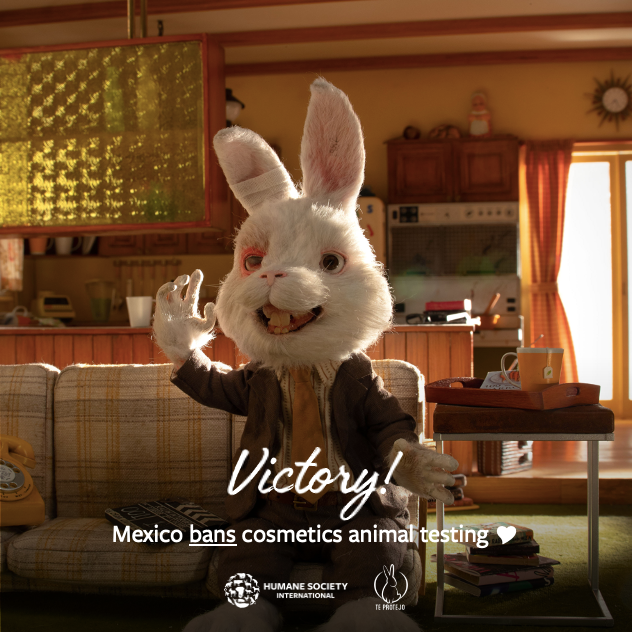
MEXICO CITY—Mexico’s Senate today gave its final and unanimous support to a federal bill to ban animal testing for cosmetics, making it the first country in North America and the 41st country globally to do so. The new law also bans the manufacture, import and marketing of cosmetics tested on animals elsewhere in the world. Humane Society International/Mexico and ONG Te Protejo whose multi-year #BeCrueltyFree Mexico campaign championed the bill, welcomed the ban jointly stating, “We are thrilled to see Mexico become the first country in North America to outlaw cosmetic animal testing, and commend our bill sponsor Senator Ricardo Monreal, and all congressmen and women for voting to end cosmetic animal testing in Mexico.”
Antón Aguilar, executive director of Humane Society International/Mexico, said: “We thank the Mexican Government for showing leadership on this important issue, and we will continue to work with them to implement the commitments and enforce a robust ban. This is a monumental step forward for animals, consumers and science in Mexico, and this ground-breaking legislation leads the way for the Americas to become the next cruelty-free beauty market, and brings us one bunny-leap closer to a global ban.”
Legislative momentum in Mexico was strongly influenced by HSI’s stop-motion animated film Save Ralph, the heartbreaking story of a rabbit “tester,” who was brought to life by a star-studded multinational and multilingual cast. The HSI film went viral worldwide, with more than 150 million social media views, over 730 million tags on TikTok, and generating more than 1.3 million petition signatures in Mexico.
Actress and advocate Rosario Dawson, who voiced Bonnie in the Spanish version of the Save Ralph film, added: “I was delighted to lend my voice to Humane Society International’s campaign to abolish animal testing for cosmetics, and could not be more proud to see the impact of #SaveRalph in leading Mexico to become the first country in North America to go cosmetics cruelty-free.”
The bill is also embraced by Lush, Unilever, P&G, L’Oréal, Avon and others in the beauty industry, who are working with HSI globally through the Animal-Free Safety Assessment (AFSA) toward policy alignment, and training measures to support smaller companies and government authorities in transitioning from animal testing to state-of-the-art non-animal methods, which are readily available and better at assuring human safety than the animal tests they replace.
With the addition of Mexico, animal testing for cosmetics is officially already banned in 41 countries, as well as 10 states in Brazil and seven in the United States. Three other U.S. states—New Jersey, Rhode Island and New York—are currently considering similar bills, and federal bills are pending reintroduction in both the U.S. and Canada.
ENDS
Media Contacts:
Humane Society International
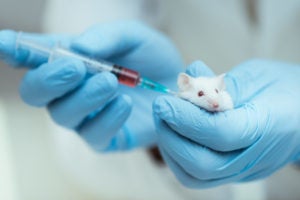
SEOUL, SOUTH KOREA—The National Assembly and Humane Society International/Korea have organized a biomedical research multi-stakeholder forum called Alternatives to Animal Testing with Scientific Approaches.
Co-hosting the event are the chair of National Assembly’s Health and Welfare Committee Minseok Kim, National Assembly members In-soon Nam and Hyun-young Shin, and the National Assembly Animal Welfare Forum. The forum is sponsored by the Ministry of Food and Drug Safety and the Osong Medical Innovation Foundation.
Prior to the forum discussion, the skin irritation test that was recently accepted by the Organisation for Economic Co-operation and Development will be showcased. This new method was developed using the model KeraSkinTM, funded by the Ministry of Food and Drug Safety’s Korea Center for the Validation of Alternative Methods. Kyung-Min Lim at Ehwa Womans University and the company Biosolution led this project. Now that the method is recognized as an international standard, it can be used for regulatory testing on cosmetics, industrial chemicals or biomedical devices.
Alternatives to Animal Testing with Scientific Approaches will be attended by representatives from Biosolution, BioToxtech, Korea Institute of Chemical Technology, Ministry of Food and Drug Safety, Nexel, Humane Society International/Korea and Bundang Seoul National University Hospital. Participants will share opinions on the current challenges, barriers in promoting alternatives to animal testing and what should change to move towards non-animal approaches.
In South Korea, while there are alternatives available, animal testing is still frequently used as the first option in research and toxicology. This is due to the lack of awareness and dissemination of new methods and has resulted in the widespread notion that alternatives are expensive or non-existent. This unfortunately discourages companies from proactively using newer, non-animal testing methods.
Committee Chair Minseok Kim said: “Animal testing replacement is relatively a new subject for health research in South Korea. However, as the technology advances and the general public is increasingly aware of animal welfare concerns, Korea is in a very good position to lead the health research and development that can mimic human responses rather than relying on animal models. I look forward to hearing from industries how we, lawmakers, can support the effort.”
Assembly member Nam said: “While there are research efforts to replace animal testing, we need a system where these research results can be disseminated, and industries are encouraged to practice them. Today’s dialogue is to understand the perspectives from relevant stakeholders in support of the bill, Act on the Promotion of Development, Dissemination and Use of Alternatives to Animal Testing Methods, also known as the PAAM Act. Feedback from industries is valuable to continue inclusive dialogue in advancing the current research and development based on humane approaches.”
Borami Seo, interim executive director and senior policy manager for HSI/Korea, said: “HSI/Korea has been pointing out the problems surrounding the absence of strategic development and dissemination plans in Korea. While Korea is renowned for its advanced technology, conventional animal testing approaches continue to be preferred despite growing concerns about their scientific and ethical limitations. We hope to see more stakeholders come together and join the conversation for the protection of humans and animals while embracing emerging technologies that can better predict human biology.”
Forum details:
Date: September 2
Location: Biosolution head office, Seoul, South Korea
Chairperson: Borami Seo, Humane Society International/Korea
Agenda:
Moderator:
Kyungmin Lim, College of Pharmacy, Ehwa Womans University
Panelists:
Humane Society International
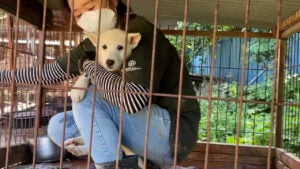
SEOUL—A dog meat farm on South Korea’s famous Jindo Island, which for more than 20 years bred and slaughtered Jindo dogs for human consumption despite them being the country’s national dog breed, has closed its doors for good after coming to an agreement with Humane Society International/Korea and Korean animal protection group LIFE. The 66 year-old dog farmer Mr Kim, who also runs a local restaurant where his dogs were on the menu, was found by local authorities to have breached the Animal Protection Act by killing dogs in front of each other, after concerned residents reported hearing dogs vocalising in terror on the farm. Instead of setting up business elsewhere, the farmer signed a contract with LIFE to give up dog farming forever and agreed to remove dog meat from the menu at his restaurant.
During the rescue, one of the dogs was found to have a microchip confirming that she is a pure bred Jindo officially registered as a “Natural Monument” under the name Jinju meaning “pearl.” The South Korean government designated the Jindo the country’s 53rd Natural Monument in 1962, nominally affording them protection under the Cultural Heritage Protection Act, meaning the farmer could face additional charges.
LIFE and HSI/Korea saved all 65 Jindo dogs and puppies found languishing in small, wire battery cages on the farm. Their fate would have been to be killed by electrocution and butchered for dog meat, and the rescuers were horrified to discover a large pile of collars in the killing area of the farm, each representing a dog who lost their life to the brutal industry. Humane Society International/Korea, which has closed down 17 other dog meat farms in the country, is campaigning for legislation in South Korea to end the dog meat industry.
Nara Kim, HSI/Korea’s campaign manager, said: “All the dogs on this meat farm are Jindos which is supposed to be Korea’s national dog breed. But instead, these poor dogs have been locked away in filthy wire cages, fed on restaurant waste, denied even the most basic care and any level of human kindness. As a proud Korean I always find it upsetting to see the cruelty of dog meat farms, but it felt especially shocking to see our country’s national dog breed being exploited like this on Jindo Island. I shed tears when I saw the killing area where I know dogs were killed in front of each other. There was a big pile of collars where they were electrocuted. Thankfully, together with our friends at LIFE, we have been able to get these dogs out of that horrible place and ensure that no animals will ever suffer again in those cages. The authorities will also pursue cruelty charges against the farmer. As the Animal Protection Act currently offers little protection for dogs on dog meat farms, it’s encouraging to see law enforcement officials making use of those few regulations at their disposal. But in order to fully crack down on this brutal industry, we will continue to campaign for a ban on the breeding, slaughter and sale of dogs for meat.”
In-Seob Sim, president of LIFE, said: “I feel anger beyond misery. We boast about Jindo dogs being our national dog, but at the same time they are on someone’s dinner table. This is a direct example of the duality of humans, but also of the contradiction in Korean society. Is there really a difference between a treasure Jindo dog and an edible Jindo dog as the dog meat traders encourage us to think? The answer is no. They are both just Jindo dogs, almost perfect pets for companionship with people.”
The rescue follows the close of the Boknal summer season in South Korea which ended on 10 August, a time when dog meat soup or “bosintang” is most often eaten, and when hundreds of thousands of dogs bred for meat on factory farms across the country are killed. Although opinion polls show that most Koreans (84%) don’t eat dog meat, of those Koreans who do eat it, 70% consume it over Boknal, in the belief that it can help relieve the effects of the sweltering summer heat.
During this year’s Boknal, HSI/Korea teamed up with vegan chefs and restaurants Baek-rin Ahn, Nammi Plant Lab, and Jung-won Park (Haru Vegan) to encourage consumers to swap dog meat soup for delicious plant-based recipes instead. Each chef devised a fresh, plant-based take on Boknal eating, incorporating many of the ingredients traditionally found in bosintang.
The dog farm rescue by LIFE and HSI/Korea follows last month’s announcement by the Ministry of Justice that an amendment will be made to article 82 of the Civil Law to grant animals legal status, stating “animals are not objects”. Humane Society International/Korea welcomes this proposal but says the deplorable conditions on this latest dog meat farm demonstrate how vital it is that the amended law brings about an end to the cruel dog meat industry.
Nara Kim says: “With the law set to change in South Korea to grant animals legal status as individuals with lives that deserve to be protected, I hope that the time has finally come for all dog meat farms here to close their doors for good.”
Humane Society International/Korea has rescued more than 2,500 dogs from certain death from 17 dog farms, who now live with families in the United States, Canada and the United Kingdom. The 65 Jindos from this latest rescue will now receive emergency veterinary care at a partner shelter in South Korea where they will also receive care and nutritious food while they undergo the vaccinations and medical tests required for overseas travel. Once they’re fit to fly, and COVID-19 restrictions allowing, HSI will fly the dogs to North America where they will begin their search for adoptive homes.
Facts:
Download Photos/Video of the Rescue
ENDS
Media Contact:
Humane Society International
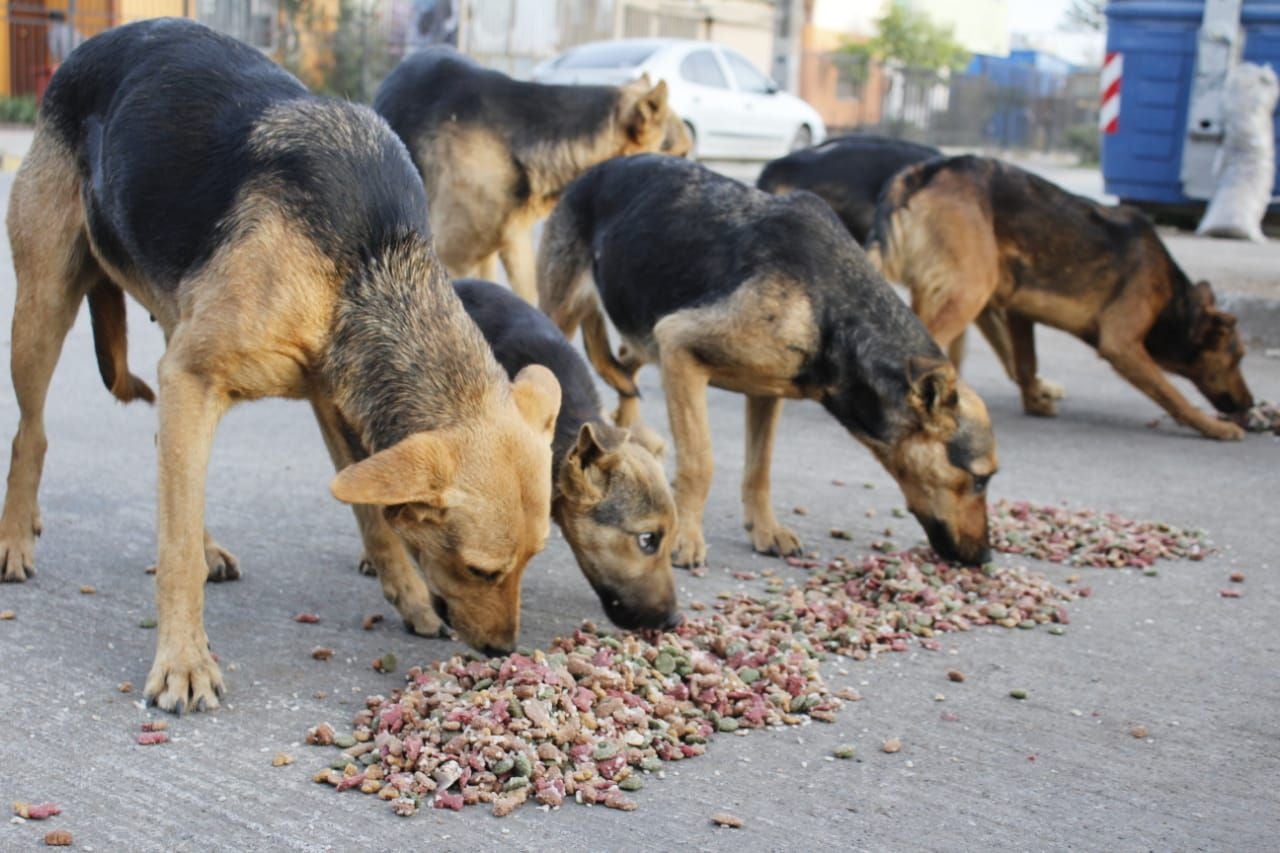
SANTIAGO, Chile—Since the COVID-19 pandemic was declared worldwide in 2020 more than 3,900 animals and counting have been fed and assisted thanks to donations made by Humane Society International.
This effort was made possible by generous aid provided by Mars, Incorporated to HSI to help communities and animals around the world during the pandemic crisis.
In coordination with thirty animal protection organizations in Chile, HSI provided more than 16 tons of food—the equivalent of the approximate weight of a bus—to dogs and cats impacted by the strict pandemic confinement measures. Additionally, more than 900 animals received basic veterinary care to treat wounds, skin problems and other ailments.
Thanks to the donation made by Mars, Incorporated, HSI delivered 16 basic emergency kits equipped with supplies and medications needed to assess and manage ailments like skin conditions, small injuries and wounds, to various groups in central Chile, benefiting more than 570 animals who required immediate assistance.
To date, local organizations in Chile delivered 16.4 tons of food for dogs and cats in 26 cities and towns across Chile. The groups distributed the aid in two phases: one starting in 2020 and the other throughout the first quarter of 2021.
“The COVID-19 lockdown has severely affected the health and well-being of dogs and cats throughout the Latin American region. Through this important collaboration with Mars, we have been able to mitigate some effects related to the lack of food and veterinary services,” said Alexandra Rothlisberger, companion animals and engagement director for HSI in Latin America and the Caribbean.
HSI recognizes that each country is experiencing the effects of the pandemic differently, and has varying animal welfare needs, which is why the Mars, Incorporated support has been extended to different parts of the world. This aid has also reached many countries in Latin America, including but not limited to Bolivia, Colombia, Guyana, Mexico, Ecuador, Guatemala and Costa Rica, and in the Caribbean, to the Dominican Republic.
Humane Society International / Europe

Dove and The Body Shop have joined PETA, Cruelty Free Europe, Humane Society International/Europe, Eurogroup for Animals and the ECEAE (representing a total of 100 member organisations from 26 EU member states*) to urgently mobilise 1 million European citizens and save cruelty-free cosmetics in Europe, following threats to Europe’s longstanding ban on animal testing for cosmetics.
In 2004, after decades of campaigning by consumers, animal protection organisations and several companies, the European Union banned the testing of cosmetics products on animals. In 2009, it prohibited tests for cosmetics ingredients and, finally, in 2013 it prohibited the sale of cosmetics that had been tested on animals. The EU’s approach became the blueprint for regulatory change in countries around the world.
ECHA is proposing new animal testing on ingredients that are known to be safe.
Yet, recent test requirements from the European Chemicals Agency (ECHA) effectively destroy the bans and threaten the additional progress the European Parliament has been boldy calling for since 2018 – a global ban on all animal testing for cosmetics by 2023.
ECHA is calling for new animal testing on ingredients that have been safely used by consumers and handled safely in factories for many years – even those solely used for cosmetics. If this goes ahead, millions more animals could be subjected to cruel tests when there are other ways to generate safety data.
The time to act is now.
The two beauty brands have come together with NGOs to galvanise consumers to take action to save Europe’s ban on animal testing by signing a European Citizens Initiative – a petition-like mechanism for EU Citizens to help shape the EU by calling on the European Commission to propose new laws.
Animal testing for cosmetics is not necessary to ensure safety thanks to modern, human-relevant, non-animal scientific methods, which safety scientists have been developing and using for decades.
Speaking with a united voice to end animal testing for beauty products, The Body Shop, Dove and animal protection organisations are calling on consumers to sign a European Citizens Initiative, demanding that the European Commission:
1. Protect and strengthen the cosmetics animal testing ban
Initiate legislative change to achieve consumer, worker and environmental protection for all cosmetics ingredients without new tests with animals for any purpose at any time.
2. Transform EU chemicals regulation
Ensure human health and the environment are protected by managing chemicals without the addition of new animal testing requirements.
3. Modernise regulatory science in the EU
Commit, before the end of its current term of office, to a legislative proposal plotting a road map to phase out all animal testing in the EU.
Together, they aim to get to 1 million signatures in the fastest time ever for a European Citizens Initiative – sending a clear message that ECHA’s demands for new testing break with the policy of animal testing as a last resort, backed by the European Commission, and break the wishes of EU citizens.
But they can’t do it alone.
European citizens can sign the Initiative here and tell the Commission they won’t accept broken promises from Europe, or regulations that mean animals suffer and die for cosmetics.
Joint animal protection groups state: “Polls show that three quarters of adults in EU member states agree that animal testing for cosmetic products and their ingredients is unacceptable in all circumstances, and 70% back a phase-out plan for all animal testing. It’s sad that once again we have to fight a battle that Europe’s citizens thought they had already won, but with a successful European Citizens Initiative, we can make decision-makers listen, protect the ground-breaking bans and secure concerted action to end the suffering of animals in EU laboratories for good**:
Dove has spent 15 years working to change the beauty industry for the better, starting with ‘Campaign for Real Beauty’ and launching the world’s biggest self-esteem programme. As a proudly certified cruelty-free brand, Dove has supported global bans to permanently end animal testing everywhere in the world, working alongside lawmakers, animal protection organisations and like-minded companies to achieve this goal.
Firdaous El Honsali, Senior Director of Global Communications and Sustainability at Dove, says: “At Dove, we stand passionately against animal cruelty. We strongly believe that there is no role for animal testing for beauty products or their ingredients and have pioneered safe and humane alternatives to assess the safety of products and ingredients for many years. This commitment drives us to take urgent action to protect the ban against animal testing in the EU. Together with our partners, The Body Shop and leading animal protection groups, we urge both our peers in the beauty industry and the general public to lend their voice in the fight to end animal testing in the EU once and for all by signing this European Citizens Initiative.”
The Body Shop has been campaigning relentlessly against the practice of animal testing for cosmetics since 1989 – helping to lead the charge towards the current ban in Europe.
Christopher Davis, Global CSR and Activism Director, The Body Shop International, adds: “The Body Shop was the first global beauty brand to fight against animal testing in cosmetics and this commitment has been at the forefront of our activist campaigns for over three decades. Our work with our campaign partners Cruelty Free International led to the original European Union ban in 2013. Today, we are calling the EU – home to the world’s largest cosmetics market – to stick to the trailblazing promise they made. We are proud to collaborate with Dove and speak as one voice, along with all those working towards a global end to animal testing for cosmetics, in support of this European Citizen’s Initiative.”
EU timeline on animal testing
2004: EU implements a ban on animal testing for finished cosmetic products.
2009: A ban on animal testing for cosmetic ingredients and combinations of ingredients is introduced as well as a marketing ban for all human health effects with the exception of repeated-dose toxicity, reproductive toxicity and toxicokinetics.
2013: A complete marketing ban for cosmetics containing ingredients tested on animals strengthens the existing bans.
2018: European Parliament adopts a resolution calling for a global ban on animal testing – establishing Europe’s role as a world leader in the fight against animal cruelty.
2021: In recent years ECHA has called for tens of thousands of animals to be used in cosmetics ingredients tests
NOTES TO EDITORS
Humane Society International / United Kingdom
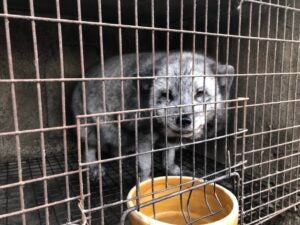
LONDON—A group of more than 100 cross-party MPs and Peers has written to the Secretary of State for Environment, Food and Rural Affairs Rt Hon George Eustice MP calling on the UK Government to cut Britain’s ties with the cruel fur industry by banning the import and sale of animal fur. Humane Society International/UK, which leads the Fur Free Britain campaign and co-ordinated the letter, is also calling on Defra to publish its analysis of the 30,000 responses submitted to its Call For Evidence on the fur trade earlier this year.
Fur farming was banned across the UK more than two decades ago in 2000, with Britain’s last remaining fur farm closing its doors in 2003. But, since then, Britain has imported more than £800 million worth of fur from countries including Finland, China, France and Poland, where tormented animals such as foxes and mink suffer for their entire lives in barren battery cages, measuring around one square metre. Continuing to allow the import and sale of fur deemed too cruel to produce on our own shores is an unacceptable double standard, say the Parliamentarians and HSI/UK.
The letter reads: “We strongly believe the fur trade is a cruel and outdated practice, which has no place in the UK.
The Government has previously said that a sales ban would be incompatible with our membership of the European Union and, as such, no action could be taken at that time. The UK has now left the EU, and the Government has an opportunity – following the call for evidence on the fur trade held earlier this year – to act as a global leader in moral standards and extend existing fur trade bans (for cat, dog and seal fur) to all animals, thus eliminating illogical protections for some species above others.
With the vast majority of UK high street stores now fur-free, a ban would have limited impact on businesses, and a proper and reasonable phase-out period would ensure that the few businesses still centred on fur could transition to alternative materials.”
Last autumn, Defra Minister Lord Goldsmith stated that: “Fur farming has rightly been banned in this country for nearly 20 years and at the end of the transition period we will be able to properly consider steps to raise our standards still further. That is something the Government is very keen to do.”
In their letter to the Secretary of State, MPs and Peers are now urging the Government to make good on that pledge.
Conservative MP Christian Wakeford who championed the letter, said: “The UK has entered a new chapter in its trading relationship with the rest of the world: banning fur sales will send a strong message that we intend to use this new beginning to set ourselves apart as world leaders in animal welfare. We were trailblazers in banning fur farming almost 20 years ago, and now Brexit has given us the opportunity to set a global example on animal welfare again. There has never been a better time to end our association with this cruel, outdated and unnecessary practice and I hope the strength of cross-party feeling on this issue encourages the Government to introduce a ban at the earliest opportunity.”
SNP MP Dr Lisa Cameron said: “The UK’s current position on fur is entirely out of step with UK public opinion. Recent polling shows that 72% of the British public support a fur sales ban, and an estimated 83% have never worn fur – this is reflected by our high streets, where almost all stores are ‘fur free.’ Government should take heed of public sentiment, reflected and reinforced by the support of over one hundred Parliamentarians for this cross-party letter, and pursue a fur sales ban without delay.”
Labour MP Maria Eagle said: “The coronavirus pandemic should force governments the world over to reconsider the way we farm, keep, and interact with animals. Exploiting fur-bearing wild species in unsanitary, overcrowded and inhumane factory farms is not only cruel, but also imposes potentially devastating public health risks. Our cross-party letter to the Environment Secretary follows the recent call by over 60 vets and virologists, encouraging governments globally to end fur farming to prevent further disease outbreaks. Following the recent call for evidence on the fur trade in the UK, Ministers must act now to ban fur sales in this country.”
More than one million petition signatures have been gathered in support of #FurFreeBritain, and public opinion polls consistently show that a UK fur sales ban would also enjoy widespread public backing. A Yonder opinion poll published in May 2021 found that 72% of the British public support a ban on the import and sale of all animal fur, replicating exactly the majority support demonstrated by a YouGov opinion poll a year earlier which also revealed Brits’ scathing view of fur as ‘unethical,’ ‘outdated,, ‘cruel’ and ‘out of touch.’
Claire Bass, executive director of Humane Society International/UK, said: “Furs from around two million tormented animals are imported into the UK each year and there is huge public and political support for Britain to stop this trade in cruelty. This letter shows clear cross-party political appetite for the Government to bring forward legislation to ban fur imports and sales.
We are also urging the Government to publish its analysis of the 30,000 responses received from members of the public and industry to its recent Call for Evidence. If opinion polls are anything to go by, we believe that the vast majority of those responses will be supportive of a ban and will want to see Britain show global leadership towards an end to this cruel, outmoded and unnecessary industry. For as long as fur is traded in Britain, we remain shamefully complicit in the suffering and death of millions of fur bearing animals for frivolous fashion.”
Earlier this year Israel became the first country in the world to ban the sale of fur, and in the United States the city of Ann Arbor in Michigan joined Los Angeles, San Francisco, Berkeley and West Hollywood in California, and the towns of Weston and Wellesley in Massachusetts, in also banning fur sales. California became the first US state to ban fur sales in 2019.
Fur Facts:
Download Photos/Video from the #FurFreeBritian Campaign
Download Photos/Video from the Chinese Fur Farm Investigation
Download Photos/Video from the Finnish Fur Farm Investigation
ENDS
Media Contact: Leozette Roode: Lroode@hsi.org; + 27 71 360 1104